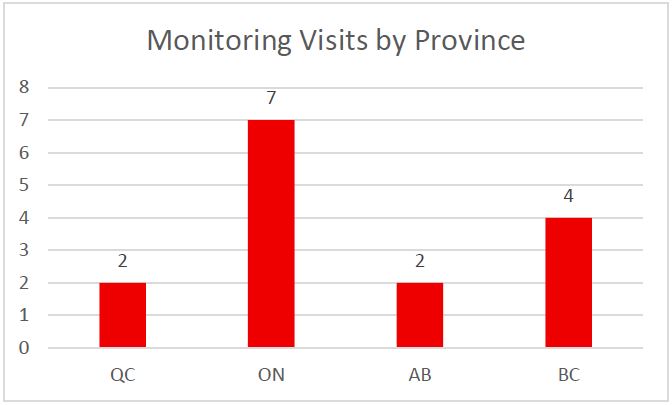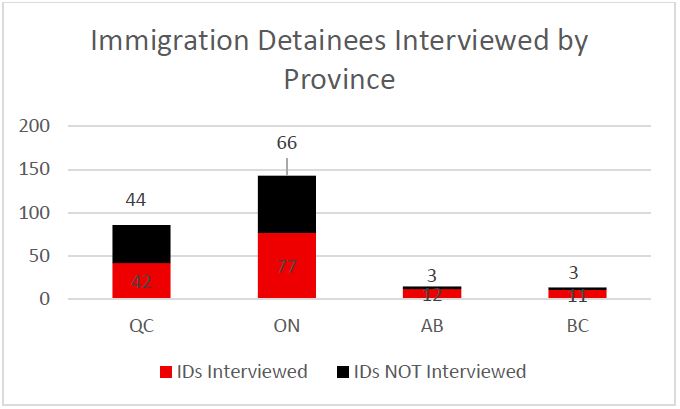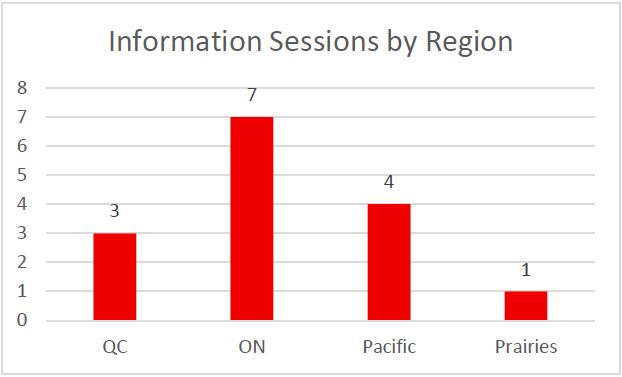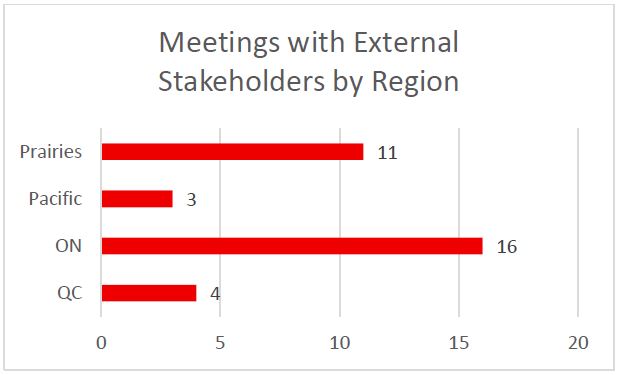Canadian Red Cross
Immigration Detention Monitoring Program (IDMP)
Annual Monitoring Activity Report
Monitoring Period - September 2017 to March 2018
This document is also available in PDF (142 Kb) [help with PDF files]
List of Abbreviations
- CBSA
- Canada Border Services Agency
- CRCS
- Canadian Red Cross Society
- CSI
- Centre de surveillance de l’immigration
- IDMP
- Immigration Detention Monitoring Program
- IHC
- Immigration Holding Centre
- IRB
- Immigration and Refugee Board
- IRPA
- Immigration and Refugee Protection Act
- IRPR
- Immigration and Refugee Protection Regulations
- NGO
- Non-Governmental Organization
- UNHCR
- United Nations High Commissioner for Refugees
Executive Summary
This report highlights the 2017-2018 observations and recommendations of the Canadian Red Cross Society (CRCS), related to its Agreement with the Canada Border Services Agency (CBSA), on the Immigration Detention Monitoring Program (IDMP).
Pursuant to this agreement, the CRCS monitoring activities focus on the following areas:
- The material conditions of detention;
- The treatment of detainees;
- The legal guarantees and safeguards; and
- The immigration detainees’ ability to maintain contact with their families.
Under the reporting period, the IDMP carried out a total of fifteen (15) visits to detention facilities holding immigration detainees between December 2017 and end of March 2018. Based on our observations made during this reporting period, CRCS grouped its concerns into the following five themes:
- Co-mingling of immigration detainees in correctional institutions;
- Lack of orientation about the detainees’ rights and responsibilities in detention;
- Difficulties in accessing certain medical services;
- Lack of access to outdoor areas in some visited facilities;
- Difficulties in maintaining contact with families.
Based on our findings and observations, the CRCS is proposing in this report a number of recommendations, mainly:
- Where detention is necessary, to hold immigration detainees in facilities other than correctional prisons and where this is not possible, to separate immigration detainees from the rest of the prison population;
- To ensure that immigration detainees are fully aware of their rights and responsibilities, regardless of their place of detention;
- To ensure that immigration detainees have access to adequate mental health services wherever they are detained;
- To provide immigration detainees with daily access to outdoor areas as well as recreational activities;
- And finally, to allow regular and adequate contact between detainees and their families.
Introduction
During site visits to places where people are administratively held under the Immigration and Refugee Protection Act, the CRCS team monitors and assesses the conditions of detention and treatment of immigration detainees held in holding centers and detention facilities under the control and management of federal, provincial, territorial or municipal authorities. In accordance with the Agreement between CRCS and CBSA, this report reflects the CRCS’ Immigration Detention Monitoring Program activities carried out between September 2017 and March 2018.
A total of fifteen (15) site visits were conducted in addition to responses to two (2) notifications. The majority of the visits took place in Ontario, followed by British Columbia, Alberta and Quebec. No visits were planned in Manitoba during the reporting period.
On each site visit, the team interviewed immigration detainees in private and without the presence of any of the facility staff. In total, one hundred and forty-two (142) detainees agreed to speak with CRCS team members whereas one hundred and sixteen (116) immigration detainees were not interviewed, either because they did not want to speak to the Red Cross or they happened to be out of the facility at the time of the visit.
At the early stage of the program, and prior to receiving security clearances, the CRCS organized information sessions for staff and facility personnel who are in direct contact with immigration detainees. Consequently, a total of fifteen (15) sessions took place, with the majority in Ontario followed by the Pacific region (BC, AB), Quebec and the Prairies.
In parallel to site visits and information sessions, the team conducted a total of thirty-four (34) meetings with external stakeholders, including CBSA representatives in the regions, Provincial Correctional Services, follow-up meetings with the Immigration Holding Centers and the Correctional Facilities as well as Legal Aid and local NGOs supporting immigration detainees.
Findings
CRCS IDMP carried out a total of fifteen (15) visits to detention facilities on a national level during the reporting period. Following these visits and the meetings that were carried out, the monitoring team would like to acknowledge CBSA representatives and all staff in the visited facilities for facilitating access to all individuals detained therein.
Based on the observations made during this reporting period, CRCS highlights the following findings and recommendations:
- 1. When housed in correctional facilities and remand centers, immigration detainees are receiving the same treatment and follow the same rules as remanded and sentenced individuals despite their detention being administrative in nature. Policies which were designed to manage behavior of persons in the criminal justice system are being applied to persons in immigration detention, such as placement in administrative and disciplinary segregation, the use of restraints, and lockdowns.
- While CRCS understands there may be barriers to ensuring separate facilities for immigration detainees, we are concerned to see immigration detainees mixed or co-mingled with persons awaiting trial, convicted persons awaiting sentencing, sentenced persons (provincial and federal) awaiting transfer, persons detained for violating parole conditions, or for defaulting on fines. This was the case in most of the facilities visited during the reporting period except for the Immigration Holding Centers in Laval, Toronto and Vancouver.
- Under international law, treating immigration detainees in the same manner as those detained under the Criminal Code is deemed a disproportionate practice. Where detention is necessary, the international law stipulates that it should be proportionate, reviewed regularly and its duration should be definedFootnote 1. With that in mind, CRCS recommends the CBSA leverage the initiative taken by Fraser Regional Correctional Centre, which has a dedicated unit for persons detained under IRPA to minimize co-mingling, and to ensure that immigration detainees are separated from sentenced and remanded individuals at all times while in provincial correctional facilities. The system in place in Quebec region is also worth considering as it lessens the incidence of co-mingling.
- 2. Immigration detainees who were interviewed had varying levels of knowledge around their rights and their responsibilities while at the Immigration Holding Centres or provincial correctional facilities. This resulted in limiting the detainees’ access to certain services, programs and support, including legal support and recreational programs.
- For instance, some immigration detainees in Alberta informed the CRCS that they were not consistently represented by legal counsel during detention reviews and immigration hearings, due to, among other reasons, the difficulties in reaching the Legal Services Centre by phone from within provincial facilities, and because of some cases being ineligible for Legal Aid assistance. This contributed to detainees not seeking legal counsel and, as a result, lack of understanding about their legal status and rights.
- In both Ontario and British Columbia, the CRCS met with detainees who were not aware of available programs and services within the provincial correctional facility where they are detained. In addition, detainees from all four regions covered during the reporting period indicated that they had not received written orientation information from CBSA or they had received it only in English, whereas the IRPA forms package detailing the reasons for detention is available in sixteen (16) languages.
- CRCS recommends that CBSA provides printed information on detainees’ rights in multiple languages to all facilities where immigration detainees may be placed. The CBSA’s “Information for people detained under the Immigration and Refugee Protection Act” and the CBSA’s booklet “Orientation to Immigration Detention in the Pacific Region” could be used as examples.
- CRCS also recommends providing additional verbal and written orientation information to immigration detainees upon admission in a language and format they understand, outlining how to access medical care and legal representation, use of phones, family visits, programs and services available, facility rules and disciplinary processes.
- CBSA previously facilitated some detainees’ access to Legal Aid, and it is recommended that the agency intensifies these procedures and establishes them as a regular practice through connecting detainees to the relevant department at Legal Aid and supporting their access to effective legal support for their immigration cases and detention reviews.
- 3. Immigration detainees housed within provincial correctional facilities frequently reported difficulties in accessing medical and mental health services. In the facilities visited in Ontario, and according to the authorities in place, perceived delays in receiving care are due to the high volume of the general criminally detained population requiring medical assistance. In Alberta, correctional and health staff at the visited facilities indicated that they do not generally have a specialized training on immigrant or refugee needs, as immigration detainees represent a very small fraction of the overall population. In addition and in Quebec, some of the interviewed immigration detainees suffered from a number of mental health problems, not only related to their detention, but also to their background after being through perilous journeys before arriving in Canada. It was observed that not enough mental health support was provided, with a psychologist/psychiatrist visits being only once per week.
- On provision of health care in detention, international lawFootnote 2 says that the State is responsible for providing health care for its detainees, without discrimination of their legal status. The law also stipulates that the standards of health care in detention should be of the same level as those available in the community. In addition, the CRCS notes that immigration detainees have a right to health care coverage under the Interim Federal Health Program and that coverage includes mental health careFootnote 3. Based on this, the CRCS recommends that the Canadian authorities ensure that immigration detainees have on-site access to medical services, including Mental Health support, regardless of their place of detention.
- 4. Limitation in access to outdoor areas, leisure, cultural and educational activities were observed. For example, the location of the Immigration detention at the BC Immigration Holding Centre in Vancouver, while short term, does not allow for outdoor access or natural light. Capacity to address any potentially negative impacts from this or heightened stress around detention is reduced due to the absence of medical staff and social workers on site. In Ontario, immigration detainees interviewed in correctional facilities noted they were limited in their access to recreational and educational programs as they lacked knowledge of how to access such activities or in some instances these programs were not extended to cover persons detained under IRPA.
- Under International LawFootnote 4 and given the non-criminal status of persons in immigration detention, detainees should not be required to remain in their room all day long but have the right to rest and leisure and to take part in educational programs. Such activities are highly encouraged in a detention context as they are important for personal development, physical and mental health, and social and cultural inclusion. Moreover, they can contribute to reducing the negative effects of incarceration by relieving stress and promoting positive interactions with others. CRCS recommends that CBSA ensures immigration detainees have access to recreational and educational programs regardless of their place of detention.
- 5. CRCS monitoring activities revealed gaps with the detainees’ ability to maintain contact with the outside world from within the facility. This reality is aggravated in facilities where open visits with family and friends are not provided. The issue is mostly due to the phone systems in place preventing detainees from making long distance calls, calling mobile devices or making international calls. This common issue was observed in all regions where detention monitoring visits were conducted during the reporting period.
- Contacts and visits from the outside world, in particular with family members, are important for detainees in dealing with the consequences of the deprivation of freedom and is a guaranteed right under both national and international legislationsFootnote 5. This right of contact is extended to involve family members and friends and may take the form of verbal and written communication and actual visits. For immigration detainees in particular, being held in a foreign country amplifies the distance between them and their family members living abroad and their need for regular and adequate contact with the outside world.
- Given the historical challenges with the phone system in provincial correctional facilities, CRCS recommends that CBSA ensure immigration detainees have regular and adequate access to contact family and friends, regardless of their place of detention, including through long distance and international calls, as well as the ability to call mobile numbers. CRCS also recommends development of a standardized protocol to ensure all detainees are consistently provided opportunities to maintain contact with family and friends, especially for detainees whose relatives live abroad. Contact visits for immigration detainees and their families are recommended, particularly for those with children, long-term detainees, and prior to removal.
- 6. Correctional and medical officers in the visited facilities are generally not provided with sufficient training on the nature of immigration detention as well as the detained asylum seekers and refugees’ needs, as immigration detainees represent a very small fraction of the overall population.
- CRSC recommends staff working directly with immigration detainees be trained and to include individuals with professional backgrounds such as immigration and refugee lawyers, healthcare and social work. The CRCS believes that multidisciplinary teams are better positioned to identify symptoms of distress displayed by immigration detainees and have greater capacity to provide timely and appropriate support related to their needs and wellbeing. In addition, CRCS recommends raising awareness among CBSA and correctional facilities’ personnel on the nature of immigration detention and its differentiation from criminal detention.
Conclusion
The CRCS has been involved in monitoring of CBSA’s immigration detention in Canada since 1999. As an independent and neutral third-party humanitarian organization, the CRCS acts according to its fundamental principles of Impartiality, Neutrality and Independence, providing unbiased reviews and recommendations to the Canadian authorities with the aim to safeguard rights and improve the conditions of detention for immigration detainees.
The CRCS detention monitoring is administered by the IDMP and is governed by the provisions of, and in accordance with, the Contract between the CRCS and the CBSA encompassing the period from June 28, 2017 to July 15, 2019 inclusive. This report presents the CRCS’ IDMP activities, observations and recommendations carried out between September 2017 and March 2018.
Both the findings and the recommendations made in this report are aimed at improving the conditions of detention for immigration detainees in a number of areas, including but not limited to:
- The place and period of detention;
- Access to information pertaining to legal guarantees;
- Access to medical services and recreational activities;
- Personnel training; and
- Contact with the outside world.
CRCS stands ready to discuss the findings made in this report with CBSA and to advise where possible on how to continue improving the conditions of immigration detention in Canada. Additionally, CRC is ready to receive CBSA’s official response on the recommendations made in this document.
- Date modified:



